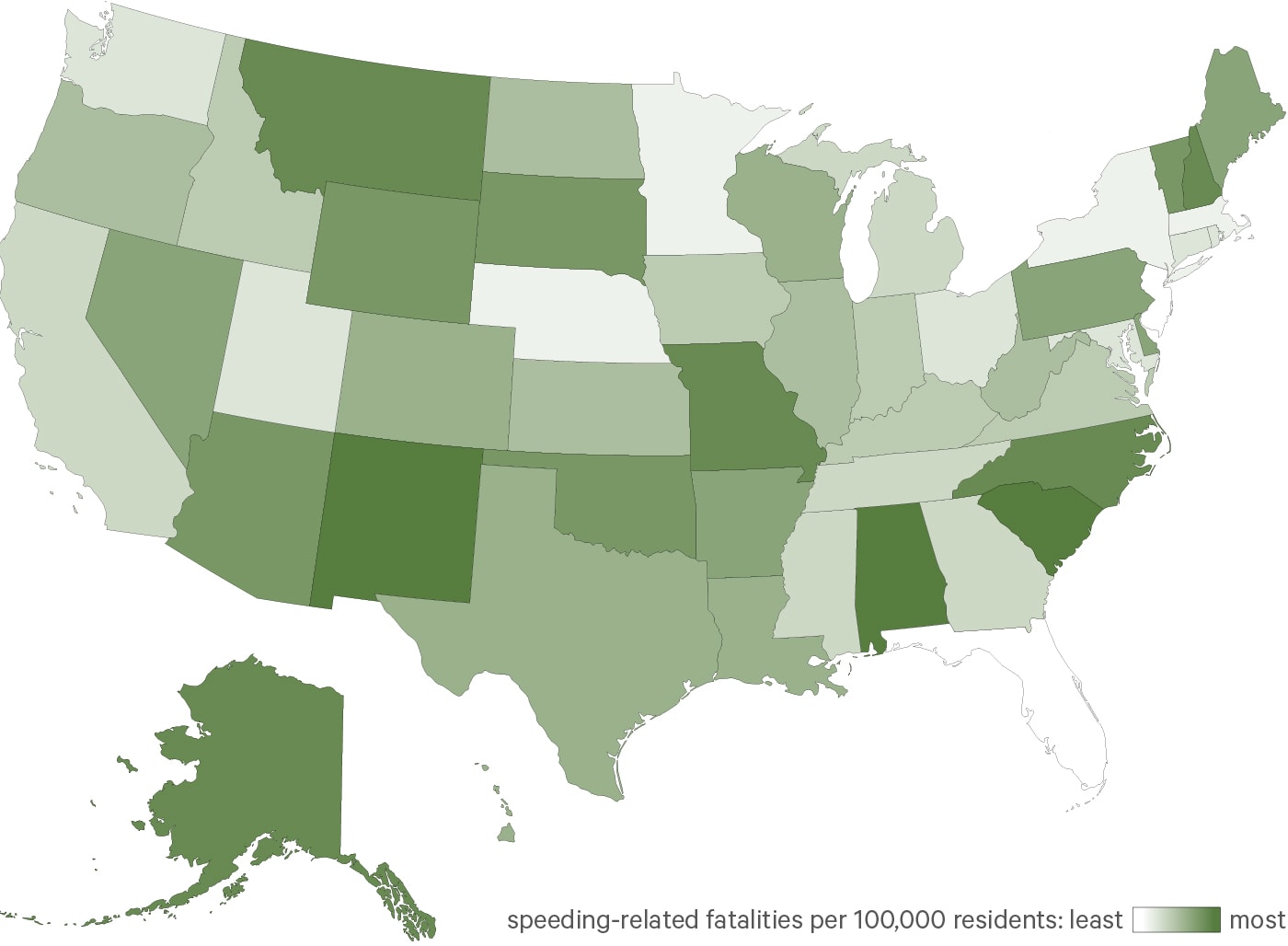Auto Insurance
In Which States Does Speeding Cause the Most Deaths?

Top 10 states where speeding is causing the most deaths
1. South Carolina
7.68 speeding-related deaths per 100,000 residents
South Carolina ranks as the deadliest state in the country when it comes to speeding-related fatalities. Data from 2016 shows that there were 381 deaths attributed to speeding, which represents a 25% increase since 2013. In fact, speeding-related fatalities in South Carolina haven't been as high since 2007.
2. New Mexico
6.97 speeding-related deaths per 100,000 residents
In New Mexico, speeding has resulted in more deaths than drunk driving has since 2010. In 2016, the most recent year data was available, there were 23% more speeding-related deaths than drunk driving deaths. Speed limits in New Mexico can reach as high as 75 miles per hour. However, there are other states, such as Utah, where speed limits are even greater, yet there are fewer speeding-related deaths.
3. Alabama
6.52 speeding-related deaths per 100,000 residents
In most states, including Alabama, fines for speeding violations are typically doubled if the incident takes place within a construction work zone. The base fine amount for a speeding violation depends on the exact speed and location where a driver was ticketed. In Alabama, 22% of crashes in work zones result in injuries.
4. Montana
5.85 speeding-related deaths per 100,000 residents
In Montana, nearly one in three traffic fatalities are attributed to speeding. A law passed in 2015 increased the speed limit on Interstates 90 and 15 to 80 miles per hour, up from 75 miles per hour. The law also raised minor speeding fines and fines for those who are driving 31 miles per hour or more above posted limits from $100 to $200.
5. New Hampshire
5.77 speeding-related deaths per 100,000 residents
While there are many factors that cause deadly traffic accidents in New Hampshire, speeding is the top one. In fact, 57% of all traffic fatalities in the state are caused by drivers who are operating their vehicles over the legal speed limit. New Hampshire uses presumed speed limits, which means drivers who exceed the speed limit have not automatically violated the law. Drivers have the opportunity to go to court and prove that they were operating their vehicles at a safe speed.
6. North Carolina
5.58 speeding-related deaths per 100,000 residents
Speeding poses a large problem in North Carolina, particularly in work zones, which puts construction workers at risk. According to the North Carolina Department of Transportation, speeding and distracted driving account for more than half of all work zone crashes in the state. Furthermore, it only takes 49 seconds longer to travel through a two-mile work zone when driving at 45 miles per hour than when driving at 65 miles per hour. Speed limits vary in work zones, but they're usually significantly lower than the normal speed limit.
7. Missouri
5.38 speeding-related deaths per 100,000 residents
Speeding, impaired driving and improper lane usage are the three leading contributing factors of fatal traffic accidents in Missouri. Drivers in Missouri utilize their seat belts less than drivers across the country. According to the Missouri Coalition for Roadway Safety, only 84% of Missouri drivers wear seat belts, which is 6% lower than the national average. Missouri is one of 15 states with no primary seat belt law, meaning drivers and passengers in Missouri can't be ticketed for not wearing a seat belt unless they're also violating other traffic laws.
8. Alaska
4.85 speeding-related deaths per 100,000 residents
In Alaska, speeding-related fatalities have historically accounted for the largest percentage of total traffic deaths, according to the Alaska Highway Safety Office. However, recently speeding-related deaths have fallen to be largely in line with drunken driving and unrestrained passenger deaths. In Alaska, grant-funded events have helped drive a higher number of issued speeding citations.
9. Oklahoma
4.66 speeding-related deaths per 100,000 residents
A new law, which is set to take effect in early August, will cut the cost of a basic speeding ticket to $100 from $224.50 in Oklahoma. Mary Fallin, Oklahoma's governor, says she hopes imposing a lower ticket price for speeding will remove any hesitancy police may have when issuing them. The new law will only impact drivers who are driving one to 10 miles per hour over the speed limit.
10. Vermont
4.64 speeding-related deaths per 100,000 residents
Speeding-related deaths in Rutland and Windham Counties make up 34% of all speed-related fatalities in Vermont. While Vermont ranks as the 10th-deadliest state when it comes to speeding, some counties, like Grand Isle and Orange, hadn't recorded any speeding fatalities in the latest available year of data.
States with the most speeding-related fatalities
A gradient map outlining the states with the greatest number of speeding-related deaths per 100,000 residents can be found below. A darker color shade represents a higher number of speeding-related fatalities.

Potential consequences of speeding
If you're pulled over for speeding, expect consequences. Below, we list a few of the common repercussions for speeding.
Higher auto insurance rates: Auto insurance companies research your personal driving record when determining your auto insurance premium. Therefore, anything that indicates risky driving behavior, like speeding tickets, will cause your insurance rates to increase. Based on our sample in a recent study, a single speeding violation where a driver is traveling 10 miles per hour over the posted limit can result in a 25% increase in the cost of their auto insurance.
Suspended license: In most states, your license is unlikely to be suspended after a single speeding violation. However, multiple offenses within a certain time frame can lead to a suspended license. And much like driving without insurance, most states have strict penalties for driving a vehicle without a license.
Fines: Anyone caught speeding will likely have to pay a hefty fine. Since speed limits can be imposed by the state as well as local officials, fines for speeding vary widely depending on your location. Furthermore, the fine you'll have to pay will also be impacted by how much over the speed limit you were driving. For example, in Summerville, S.C., speeding drivers have to pay about $82 for driving one to 10 miles per hour over the limit, but they pay $445 if they're exceeding the limit by at least 25 miles per hour.
Jail time: Minor speeding violations are unlikely to result in jail time, but if you're speeding well above the limit, it could be deemed reckless driving. Unlike speeding, reckless driving often carries jail time on top of fines. In Alabama, for instance, a first-time offender could be charged with up to 90 days in jail for reckless driving.
National rankings of states where speeding causes the most fatalities
State | Speeding-related fatalities in 2016 | Speeding-related fatalities per 100,000 people | Rank |
|---|---|---|---|
| Alabama | 317 | 6.52 | 3 |
| Alaska | 36 | 4.85 | 8 |
| Arizona | 311 | 4.49 | 11 |
| Arkansas | 117 | 3.92 | 18 |
| California | 1,056 | 2.69 | 36 |
| Colorado | 211 | 3.81 | 20 |
| Connecticut | 79 | 2.21 | 41 |
| Delaware | 39 | 4.10 | 16 |
| Florida | 310 | 1.50 | 49 |
| Georgia | 266 | 2.58 | 37 |
| Hawaii | 54 | 3.78 | 21 |
| Idaho | 54 | 3.21 | 30 |
Methodology
Data for the number of speeding-related fatalities by state was gathered from the National Highway Traffic Safety Administration. The figures were then adjusted by the population of each state as reported by the U.S. Census Bureau to determine fatality rates.
